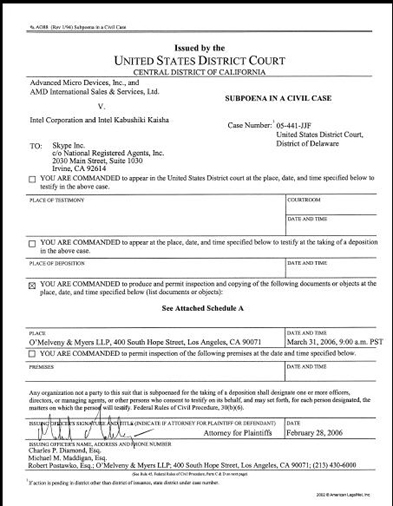My interview with AMD's lead attorney on the Skype-Intel case


Late yesterday, I interviewed Chuck Diamond, partner at O'Melveny & Myers LLP in Los Angeles.
Diamond is also semi-conductor manufacturer Advanced Micro Device's (AMD) lead attorney in an antitrust suit filed last June against rival chipmaker Intel.
Diamond's most immediate pursuit is to obtain documents from Skype relative to what AMD believes may be anti-trust behavior on the part of Skype and Intel.
The specific bone of contention involves a new feature in Skype 2.0 that makes it possible for users of PCs with advanced Intel chips to participate in Skype conference calls with as many as 10 users at a time.
Meanwhile, this feature is not available to AMD chip users. They are limited to as many as five conference call participants at any one time.
This differential has roused AMD's suspicions and ire- enough so for Diamond and his team to demand any documentation from Skype related to how a presumed deal to offer this exclusivity was struck.
Late yesterday, I interviewed Chuck Diamond about AMD's pursuit of this presumed documentation. A subpoena to that effect has been served to Skype. Here's a link to my post describing the subpoena. To read the subpoena page by page, click this link.
Highlights of the interview follow, and are edited for clarity. Indented comments are Chuck Diamond's.
ZDNet- What is driving this inquiry on AMD's part?
All of the facts are not out on the table- (But) we have been told there is no earthly technological reason why Skype cannot function on AMD dual processors. Our product has been more highly rated than Intel's so it is assumed it should work even better (with Skype)
ZDNet- What are the main problem areas for AMD engineers as they look at the Skype-Intel conference call capabilities?
We can only conclude that the folks at Skype are uncharacteristically degrading their own software. The fact that AMD platforms can't get the same capabilities (as Intel's) is really quite perplexing to us considering that Skype has been among the more progressive players in software.
ZDNet- How do AMD techs believe this "degrading" is being done?
I am told, and it has been publicly reported, that Skype 2.0 has a Runtime routine in the CPU ID that can be used to identify the type of processor. That is our understanding from the AMD engineers we are talking to.
ZDNet- There are lots of examples where companies strike up alliances to maximize the performance of partner products and platforms. What's different here?
We can only conclude that the folks at Skype are uncharacteristically degrading their own software. The fact that AMD platforms can't get the same capabilities (as Intel's) is really quite perplexing to us considering that Skype has been among the more progressive players in software. Intel should be judged by (anti-trust) rules. They have a certain obligation to compete fairly on the merits, rather than paying to directly or somehow indirectly disable products run on competitors' platforms.
ZDNet- Where, in your judgment, does anti-trust law apply to this controversy?
Part of anti-trust law (advises) a broad-based look at whether that dominant firm unduly engages in exclusionary practices that are not pro-competitive and not pro-consumer. We are not taki8ng the position that Intel is barred from helping their software vendors to optimize their products, but this is not what appears to be going on. We're not talking about optimization here- but (this is a case) of a software provider degrading the product.
ZDNet- Could this just be a one-shot example where enthusiastic partners in a business alliance may have just been a bit too overeager- and overstepped their bounds as a result?
Read our complaint. The Skype conduct can't be taken in isolation. It can be overlaid on a half decade of inexcusable exclusionary conduct (by Intel).
ZDNet- Skype, of course, is now owned by eBay. Has AMD- and has your team- considered going "over Skype's head" and, in effect, asking eBay to request that Skype "behave?"
We did make contact with eBay but they had not heard about this, and since we made that ccntact, we haven't heard back from them.
ZDNet- Do you believe there is a "sunset" provision in the Skype-Intel conference call technology you are seeking more information about?
We know that the Skype arrangement is only temporary, but the 10 (participant) conference call feature sort of reminds me of a cellphone manufacturer that would have exclusive rights to "911" calls. What is the justification for that? We can't see any earthly reason why Skype would want to do this.
ZDNet- Skype has several major competitors. What would be wrong with AMD following the "enemy of my enemy is my friend" model here, and offering special functionalities to a Skype competitor?
It is inconceivable that AMD would pay any any software provider to disable any of their functionality.
ZDNet- In your subpoena, you have asked for some detailed documentation from Skype. Is there a time frame here in which non-compliance would spark strong consideration for taking this matter to the next level?
I hate to predict the outcome and the period of time at the front end- but we'd hope to get a document (from Skype) in the next 60 to 90 days.
ZDNet- I know this is specifically addressed in the subpoena, but what is it that you want to see in this documenation you are demanding?
We would like to see anything related to any agreements between Intel and Skype- internal communications, and what has been offered in exchange.
ZDNet- What would be your next step after this documentation is presumably handed over?
I think we have to wait until we see what these documents show. This is, after all part of a much larger lawsuit to try and free up the market from unreasonable and unlawful restraints.
That's my interview. What is your reaction to all of this so far? Post a TalkBack!